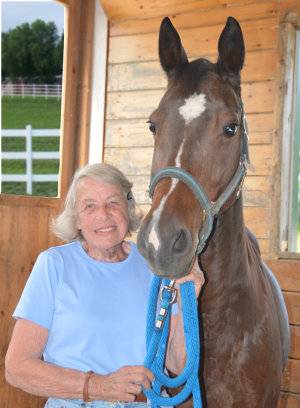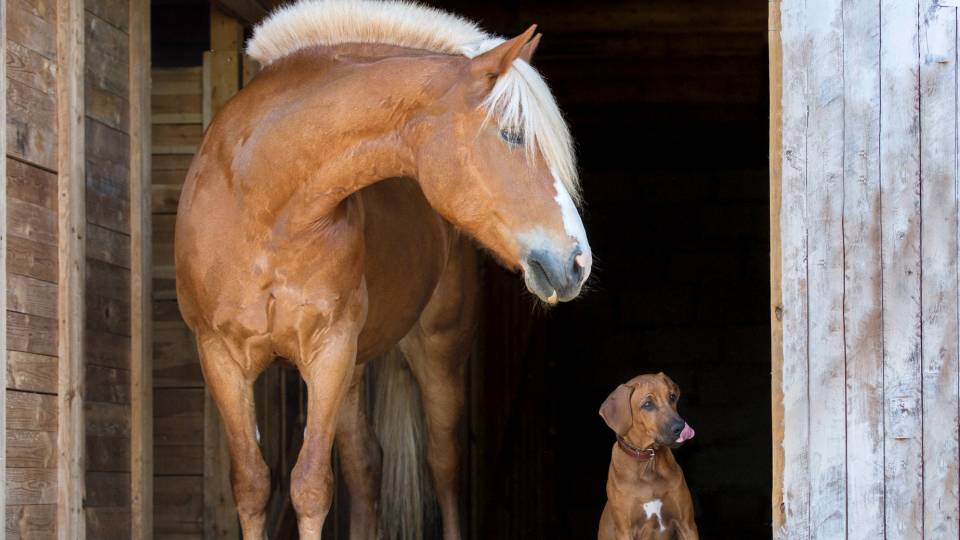A conversation with Maine State Society for Protection of Animal’s President, Marilyn Goodreau and Vice President & CEO, Meris Bickford by MFOA’s Jayne Winters

1. The MSSPA web site states that the Society was originally formed in 1872 to protect the horses which pulled Portland’s streetcars and fire engines. Please give an overview of how it has evolved to today’s largest equine facility in New England.
The Society was formed to provide “after service” care and protection for horses who then pulled the streetcars and fire engines in Portland. Following the advent and widespread use of the gasoline engine, there were virtually no horses in need of MSSPA services. For a period of time the organization was moribund and though it maintained an office on Exchange Street, it primarily raised money for other animal welfare organizations such as the Animal Refuge League of Greater Portland.
In the early 1970s, philanthropist Lawrence J. Keddy, the Society’s modern day founder, became its president; he and his life partner Marilyn Goodreau revitalized the organization and moved it to its present location on the River Road in Windham. Following a statewide survey of municipal officials to determine how the farm might best serve the needs of Maine animals, the decision to operate a large animal shelter, focused on horses, was made. The rest, as they say, is history.
2. Where do most the horses that arrive at MSSPA come from? To what degree does the State Animal Welfare Program use MSSPA after seizing horses in cases of animal cruelty?
The MSSPA does not have investigative or prosecutorial authority; primarily, it is a shelter that provides rehabilitative and re-homing services. Nearly all of the horses at the Society’s farm shelter have been seized by Maine law enforcement agents; generally those animals have been abused or neglected and their owners are subject to prosecution for violation of Maine’s animal welfare statutes. The MSSPA is the preferred placement for horses who have experienced abuse or neglect. The rehabilitation process here is robust and we devote all necessary resources required to help horses recover to their best potential.
3. Other than the inability to financially care for an animal, what do you see as causes for neglect and abuse?
In our experience the primary cause for abuse or neglect of horses is a lack of understanding that horses require daily care, nutritious feed, fresh water, shelter from the weather, hoof care, and necessary medical attention. Inexperienced or uninformed folks tend to think that horses are quite self-sufficient and can thrive on grass in the backyard during the good weather and a little hay in the winter. Such people can be educated regarding what horses actually need and poor circumstances can be improved to the benefit of the animals. Sadly, that is not always the cause of animal abuse. On occasion animals have the misfortune to be owned by people who are simply cruel or mentally ill. Those individuals are less likely to make an effort to improve the conditions of their animals.
4. Once the horse has been rehabilitated, what is your procedure / protocol in placing it in an appropriate home, to assure it’s going to be loved and properly cared for?
Our philosophy is that all horses here, once fully recovered from whatever condition brought them to the MSSPA, are available for adoption to the right home or family. We ask that potential adopters complete a preliminary adoption application, which identifies the animal(s) that they might wish to adopt. Once completed that application goes to the Society’s adoption committee; the committee meets bi-monthly and reviews all pending applications. Assuming the application is complete, the match appears to be sensible, references are checked, a pre-placement site visit is scheduled, and the horse is prepared for transport. We often ask potential adopters to come to the farm and spend time handling the horse they wish to adopt; if riding or driving of the horse is involved, we like to observe the person tack up and work the horse to ensure there is compatibility between the horse, the person, and the job the horse is being asked to do. Following a successful placement, Society staff or volunteers will make both announced and unannounced site visits to check on the adopted animals.
Our position is that people don’t adopt from the Society, they adopt with the Society. We never really cede full legal ownership of the animal because if something unforeseen occurs, we want to be able to reclaim the animal without legal action. That is often a great comfort to folks who worry about the fate of their adopted horse, should they become ill or unable to care for the horse. In circumstances of that type, the animals return to the MSSPA.
5. What is the general length stay of a horse before being adopted?
That is different with each horse; entirely dependent on the length of rehabilitation, whether training or re-training is necessary, age of the animal, the circumstances of the particular adopter, and other factors help define the length of time a horse is here in care. When horses are not suitable for placement due to medical or other conditions, they live the balance of their natural lives here receiving sanctuary services.
6. Where are adopters from?
Adopters are primarily located in Maine, though we have also done adoptions in New Hampshire and had adopted horses relocated from Maine to Connecticut, Massachusetts, even out West to Colorado. We like to be able to easily check on MSSPA horses wherever they go, so there is a preference for local adoptions.
7. We typically hear of MSSPA caring for horses, but in a lesser degree, don’t you provide shelter and medical care for other animals?
The Society has cared for many different species over the years, including cattle, pigs, barnyard fowl, goats, rabbits, dogs, cats, and of course, horses. Approximately five years ago the board of directors decided to focus its organizational energy on horses and currently the Society’s animal intake is restricted to horses. On a short term or emergency basis, we will receive and care for other types of animals to accommodate local ACOs or humane agents. We try to be as helpful as possible to anyone who is working on behalf of abused, neglected animals.
8. Your mission “is to provide refuge, rehabilitation, and placement of seized horses; support the placement of surrendered animals; and educate the public.” In what ways do you educate the public?
Our education program is delivered in several different venues. We provide guided tours at the River Road farm for groups or individuals. Within the past 12 months, we have hosted more than 250 area school children on field trips that included hands-on with rehabilitated horses, exposure to before/after photos of the rehabilitated horses, and practical lessons in equine hoof and dental care. Society staffers, by invitation, also deliver educational programming to community service clubs and groups. The Society also maintains a social media and web presence that is both informative and engaging. Recently, we worked with Up Country Productions to write and produce 13 equine educational tips that are airing during the program, “Growing Home,” that is shown on Maine and New Hampshire NBC affiliates on Sundays at 11:00 a.m.
9. As Scarborough Downs closes this year, the Maine Harness Racing Commission finds itself with $3 million of the track’s $8.4 million available annual state subsidy. It has been proposed that if some of that money was used for funding retired harness racing horses, there would less demand on the shelters. Do think such a fund should be established?
Our board of directors and management team welcome the development or identification of any resources that can be used to prevent equine abuse or address the consequences of not properly caring for horses. Those individuals or industries utilizing horses should be first to provide for the animals from whose efforts they benefit.
10. What do you envision for MSSPA in the next ten years?
The Society’s vision is the elimination of equine abuse and we are working towards it each day. Until the vision is fulfilled, we will continue to receive into care horses who have experienced abuse or neglect and been removed from their abusive owners. We will continue to rehabilitate and re-home them. In fact, the Society has just finished a record-breaking year of successful adoptions, with 14 horses leaving our facilities for families of their own. In the short terms we are planning a capital expansion that will include an indoor arena to provide safe work/play space for the horses all year round as well as an updated space for events, educational activities, and administration of New England’s premier shelter for horses. During the next decade, we expect to offer additional programming to the public including equine assisted learning, birding and hiking on the MSSPA’s spectacular 124 acre farm, and internships in agricultural enterprise as well as non-profit management.


